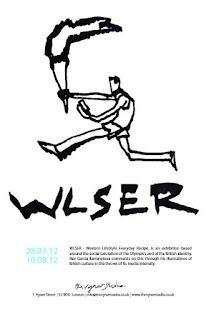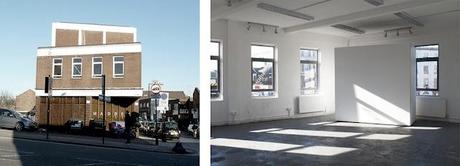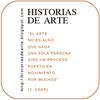 London 2012" />"More and more, we live in a world that aims to control, ups, sorry, I mean connect everything. New apps, gadgets and links... lots of links, some very useful some... not so much. And these are key ingredients of the WLSER (Western Life Style Everyday Recipe).
London 2012" />"More and more, we live in a world that aims to control, ups, sorry, I mean connect everything. New apps, gadgets and links... lots of links, some very useful some... not so much. And these are key ingredients of the WLSER (Western Life Style Everyday Recipe).
I assume that because we are witnessing so many different forms of connecting information every now and then, as a result we are unconsciously training our "analog" brains to establish links with any information we deal with. Far from being different to the mass this phenomenon affects mee too. And I guess that this is how I ended up with this drawings.
With this exhibition I want to give you a bit of my imagination that I have managed to link to my hand, linked to a marker pen, then linked to a piece of paper. NOTE: If you do this same process you can have your own drawings ;) I hope that on this exhibition you see reflected a bit of London, of 2012, the games and also a bit of yourself. Have a nice day!"
Con este texto se presenta la exposición de Iker García Barrenetxea (San Sebastián, 1979) WLSER en The Vyner Studio (os sonará, quizás, por la exposición del otoño pasado "Barcelona Design meets London Design" coordinada con el BCD y en el contexto del London Design Festival 2011), un pequeño pero dinámico espacio fundado por el mismo artista, situado en el East London - una zona tradicionalmente industrial que desde los últimos años está redefiniéndose como una encrucijada fundamental para el arte británico más emergente, a partir de la proliferación de estudios artísticos y pequeñas galerías -.

The Vyner Studio. 1 Vyner St. | E2 9DG | London | UK
Basándose en diferentes formas de comunicación propias del siglo XXI - los nuevos media, las app para smartphone, los gadgets y links propios del social media o la publicidad - y en cómo estos "ingredientes" se entremezclan con nuestra cotidianidad, las ilustraciones de Iker nos devuelven a la simplicidad del papel, la línea y el no color, en una reflexión sobre el contexto social saturado propio de los eventos olímpicos y, en cierta medida, característico también de la sociedad y la identidad británicas con las que este joven vasco convive desde hace más de 10 años.

Siguiendo con este concepto fundamental de "vuelta a la esencia del arte" que se desprende de la recuperación del dibujo y la temática olímpica - como una vuelta a la forma de mirar de esos filósofos griegos que sentaron las bases de nociones fundamentales para el arte como la belleza o la mímesis -, Iker nos presenta una muestra constituida a partir de dibujos originales en papel clavados a la pared. Así, una vorágine de trazos negros, inscripciones, retratos caricaturescos, siluetas de deportistas en acción, y alusiones a temas paradigmáticos del mundo contemporáneo, llenan el blanco espacio del Vyner St., en una referencia más que directa a la sociedad cosmopolita.
Las características de la muestra nos hablan, más allá del elaborado contenido artístico, de la propia estrategia de supervivencia (sustainability, que dicen los ingleses) de la galería y del artista - además de la obra original, la sala ofrece "merchandising WLSER": pósters, pequeñas litografías enmarcadas, camisetas, y se planteaba la posibilidad de incluir un "libro para colorear" para adultos, consituido a partir de las ilustraciones de Iker e invitando al espectador a realizar sus propias masterpieces -.
La idea de "exposción low cost" va tomando fuerza en los tiempos que corren, ferias de arte virtuales, debates de arte a través de hashtags o exposiciones en la blogsfera, son iniciativas de un colectivo de gestores que han tomado ya consciencia del tortuoso camino que la cultura está emprendiendo en esta época de crisis. Iker se suma a este "descenso del pedestal" de la cultura apostando por una obra en formato poster, en una serie que puede archivarse y enviarse en un tubo de cartón y que se puede montar desde en galerías a espacios urbanos; ofreciendo su propia respuesta a la pregunta contemporánea de ¿qué pasará con la conservación y difusión de las obras de arte clásicas, en un panorama económico como el contemporáneo?
De esta manera, WLSER se presenta como algo más que una serie finita de dibujos, es más bien el concepto que podría englobar un amplio abanico de "productos artísticos" que pretenden reflexionar sobre las características psicológicas del mundo global contemporáneo y que podría ir desde las chapas más punk a obras finalizadas y deliciosamente enmarcadas para "nuestros maravillosos salones decorados al gusto del consumidor" (según palabras del mismo artista).
[ENG]
With these words, Iker García Barrenetxea (San Sebastián, 1979) presents his exhibition WLSER at The Vyner Studio, (it may sound familiar to you due to its recent exhibition "Barcelona Design meets London Design" coordinated with BCD during the London Design Festival in October 2011 edition). It is a small but dynamic space founded by the artist on his own, and located is in East London – a traditionally industrial area that is being redefined as a fundamental point for emergent British art, on the basis of the spread of art studios and small galleries during the last few years –.
Based on different forms of communication within the twenty-first century: new media, smartphone applications, gadgets and links usually found in social media and advertising. The way these “ingredients” blend within everyday life, Iker's illustrations bring us back to the simplicity and clarity of this: paper, line and black and white. The drawings are a reflexion and reaction to the Olympics, media social saturated has given us these unique circumstances. Characteristic of British society and identity, with which this young Basque has been living for more than 10 years.
Following this fundamental concept of “returning to the essence of art” deduced from the recuperation of drawing and the Olympic topics – returning to the fundermentals of the Greek philosophers who laid the notions of beauty or mimesis –, Iker presents an exhibition made up of original ink on paper drawings tacked to the wall. In this way, a maelstrom of black lines, inscriptions, caricatural portraits, athlete silhouettes, and illusions to a contemporary world's paradigmatic issues, filling the white space at Vyner St. in a direct reference to the cosmopolitan society.
The Exhibition's characteristics talk us about galleries' and artists' sustainability (beyond the elaborate artistic content). Apart from original masterpieces, the Vyner St. showroom offers “WLSER merchandising”; posters, small framed lithographs, T-shirts, this presented the possibility of including a “coloring book” for adults, made from compiling Iker's illustrations, where the viewer is invited to create their own masterpieces.
Presently, the “Low Cost Exhibition” idea is taking shape: online art fairs, debates via hashtags or exhibitions on the blogosphere are initiatives of a group of cultural managers who have already become aware of the culture's tortuous path in this time of financial crisis. Iker's contribution to this culture “pedestal drop” is a poster formated work of art that can be stored and sent in a cardboard tube, and shown from galleries to urban spaces. This way, Iker is offering his own answer to the contemporary question of how conservation and diffusion of classic masterpieces must be understood in this new economic landscape?
Thus, WLSER is presented as something more than a finite series of drawings, this is a concept that could include a wide range of “artistic products” reflecting on psychological characteristics of a contemporary global world, from punk pins to completed and delightfully framed works for “our wonderful halls decorated to suit the consumer” (in the artist's own words).

